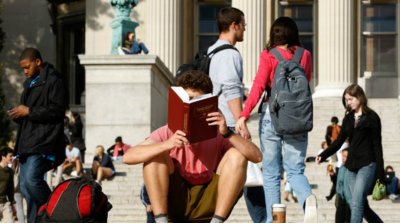The antisemitism of the university double standard

A central feature of antisemitism is the application of a double standard by treating Jews differently from how other groups would be treated in similar circumstances. By this definition, antisemitism is a common practice at universities.
My recent experience at the University of Arkansas helps illustrate the problem. When Donald Trump was elected president in 2016, I was the head of an academic department there.
We were told by senior administrators that this election result might be traumatizing to faculty, staff, and students who were not U.S. citizens, so we were instructed to reassure foreign nationals that the university cared about them.
To accomplish this, senior administrators provided us with funds to take these foreign nationals out for lunch to listen to their concerns. The irony that we were using the money of Arkansas taxpayers to buy lunch for people who might feel “unsafe” because of the democratic decision of those same taxpayers didn’t occur to the university’s leaders.
If buying a group lunch to comfort them over an election result is how the University of Arkansas shows that it cares about foreigners, then its recent actions suggest that the university manifestly does not care about its Jewish faculty, staff, and students.
In the wake of the worst atrocity committed against Jews since the Holocaust during World War II, which was followed by mass protests on college campuses nationwide in support of that mass slaughter, rape, and kidnapping, the University of Arkansas didn’t offer to take its Jewish affiliates out to lunch.
Instead, the university organized a panel to discuss the Israel-Hamas war that featured two professors from the school’s King Fahd Center for Middle East Studies who are stridently anti-Israel. One professor praised the chanting of the genocidal slogan “From the river to the sea, Palestine will be free.” The other says another Iran-backed terrorist organization, Hezbollah, shouldn’t be considered as one because it provides social services.
Do you see the double standard? The university buys lunch for foreign nationals to address the imaginary trauma of a democratic election result, but Jews who are experiencing actual physical threats get treated to a university-organized hate rally.
The differential treatment of Jews isn’t confined to the University of Arkansas. It is pervasive in higher education.
Following the May 2020 death of George Floyd in the custody of Minneapolis police, universities across the country canceled classes and exams — sometimes particularly exempting black students — for fear that the event was too traumatizing to expect students to focus on their studies.
At UCLA, a professor actually was removed from teaching and placed on leave for failing to agree to a request that he postpone an exam for black students in his class.
By contrast, Jewish students currently are walking past protests, often involving faculty members, to attend classes and take exams in courses taught by those same professors who were just chanting for intifada, or the Palestinian uprising.
Some of the heavily armed Hamas terrorists piloted paragliders to invade Israel on Oct. 7.
After one flyer promoting a pro-Palestinian rally featured the image of a paraglider, the executive director of the Jewish student organization at Cal State Long Beach, Chaya Leah Surfin, colorfully put it this way: “Look at what my Jewish students on campus have to deal with. Those paragliders were used to murder 300 Jewish young people. Only the Jews have to put up with this s—.”
When she asked university administrators for help protect Jewish students, they recommended counseling services.
The double standard in how universities treat Jews isn’t characterized only by a refusal to protect Jewish students from real threats that might legitimately interfere with their studies. It also is marked by the excessive coddling of other groups who are imagined to be completely incapable of managing even remote sources of stress.
Universities expect too much of Jewish students to handle genocidal chants and physical assault, too little of foreign nationals to handle an election result,and black students to handle police misconduct in a city across the country.
Of course, no group of students should have to experience distress. But when these incidents happen, universities should respond to them consistently. Subjecting Jewish students to harsher treatment and expressing little concern for their difficulties is precisely what antisemitism looks like.
Higher education has an antisemitism problem and it’s about time that colleges and universities address it by developing consistent policies and practices for all groups of students on campus.
Originally published at The Daily Signal.
Jay Greene is a senior research fellow in the Center for Education Policy at The Heritage Foundation.




















